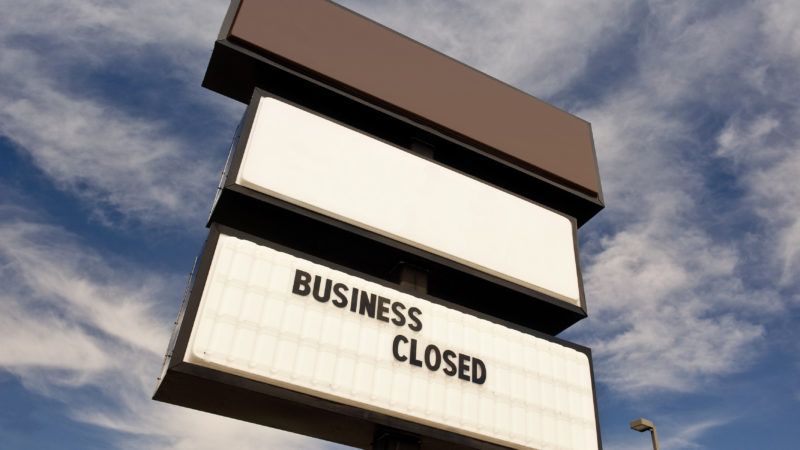Economic Crisis Deepens as Business Closures and Unemployment Claims Rise
Data from Yelp shows that the long-term economic toll of the coronavirus pandemic is only starting to be realized. And federal unemployment data shows layoffs are climbing again.

Speaking from the White House on Tuesday evening, President Donald Trump warned a pandemic-weary nation that the COVID-19 crisis will "probably, unfortunately, get worse before it gets better."
The president was speaking about the public health aspect of the coronavirus pandemic, but the same warning might as well apply to the U.S. economy.
Indeed, just a few hours earlier and a few blocks away from the White House, the owners of a well-known Washington watering hole, Maddy's Tap Room, announced that they could fight the good fight no longer.
"We tried, but the economic impact was just too much," the bar's owners posted on Facebook.
Maddy's is hardly alone. New data released by Yelp, through which customers can review local businesses, shows that permanent business closures is on the rise nationwide, even as consumer activity continues to slowly increase. The Wall Street Journal reported Thursday that small businesses are bracing for a prolonged crisis. Even big businesses like airlines are now making further cuts, having already pared back services considerably when the pandemic first arrived.
Unsurprisingly, restaurants have been the hardest hit. Since March 1, Yelp's report shows 26,160 total restaurant closures nationwide. About 60 percent of those closures are permanent.
Restaurants come and go all the time, of course, but pandemic-related closures are not exactly typical creative destruction. First, many establishments were forced to close by government fiat. Weeks later, they reopened, but with restrictions on how and where patrons could be served. Many places, including Washington, D.C., abolished nonsensical restrictions on selling alcoholic drinks to-go in order to give bars a possible lifeline while indoor service was reduced or banned. Expansion of outdoor seating was another temporarily workable solution during late spring and early summer.
But, ultimately, there's no substitute for a packed house on a Friday night—and that's simply not realistic right now, for reasons that have to do as much with regulations as with the choices of individual consumers.
Overall, Yelp reports an uptick in permanent shuttering relative to temporary ones. In its last economic report, released in April, Yelp found more than 175,000 total businesses were temporarily closed. Since then, less than 25 percent have reopened.
The fact that businesses continue to close even as many states are lifting their stay-at-home orders indicates the depth of our economic crisis. When you consider that the lockdowns during March and April were mostly voluntary and that no government official can re-open the economy simply by declaring it no longer closed, it now seems pretty clear that consumer behavior will remain cautious (and economic activity suppressed) until COVID-19 is contained.
"Many businesses that eagerly reopened doors in June were forced to scale back operations and in some cases even shut down again—a costly action for many small businesses," the Yelp economic report notes.
Federal assistance for small businesses, like the Paycheck Protection Program (PPP), may have staunched some of the initial bleeding. The PPP has pumped more than $500 billion in forgivable loans into businesses so they can keep furloughed workers on payroll, but the program has been beset by problems. The initial round of $300 billion was exhausted almost immediately, in part because loans were secured by businesses not intended to be recipients—including businesses owned by lobbyists and Trump's family. Businesses have complained that the process for getting loans is slow and the approving parties unresponsive. As it turns out, you can't expect bureaucrats in Washington to be effective substitutes for the billions of daily transactions that keep the economy working.
If the crisis drags on and more businesses are forced to close their doors permanently, those loans may end up having merely flattened the curve—to borrow a phrase from the public health aspect of the crisis—of job losses.
But it may not have even done that. On Thursday, the Department of Labor announced that there were 1.4 million initial unemployment filings during the past week. That's the 18th straight week with at least 1 million requests for unemployment benefits, and a number that suggests layoffs are beginning to climb again.
How bad could it get? The Partnership for New York City, a civic group, estimates that roughly 77,000 New Yock City businesses will close before the pandemic ends. That's about one-third of all employers in the city.
The only way to reopen the economy is for most people to feel safe going out to restaurants and stores again. That won't happen—at least not on a large enough scale for small-margin businesses to survive—until the number of coronavirus cases and deaths start falling.
It's a vicious cycle for the country and a death spiral for many businesses.


Show Comments (85)